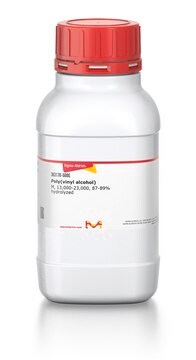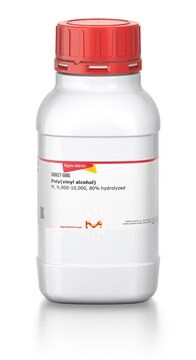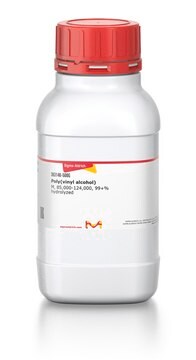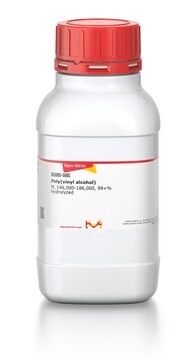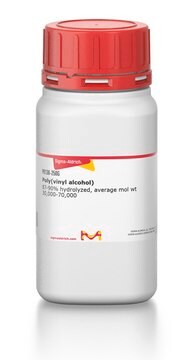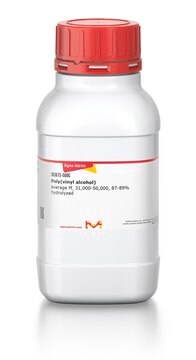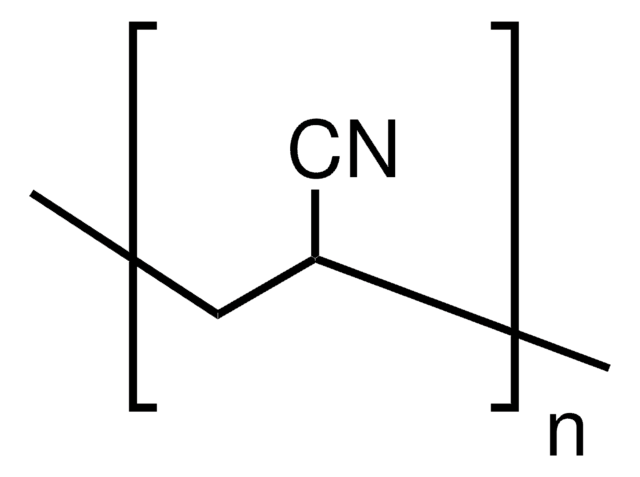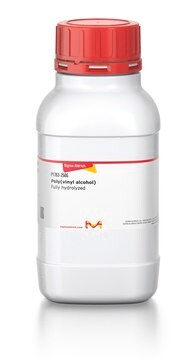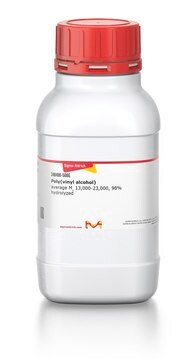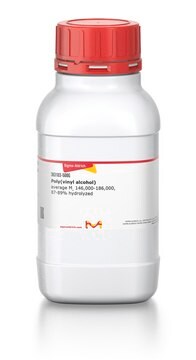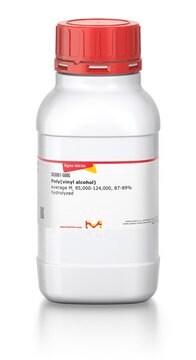363138
Alcol poli(vinilico)
Mw 31,000-50,000, 98-99% hydrolyzed
Sinonimo/i:
PVA
Autenticatiper visualizzare i prezzi riservati alla tua organizzazione & contrattuali
About This Item
Formula condensata:
[-CH2CHOH-]n
Numero CAS:
Numero MDL:
Codice UNSPSC:
12352104
NACRES:
NA.23
Prodotti consigliati
Livello qualitativo
Stato
powder
PM
Mw 31,000-50,000
Caduta di sfera
5.4-6.5 cP, 4 % in H2O(20 °C)(lit.)
InChI
1S/C2H4O/c1-2-3/h2-3H,1H2
IMROMDMJAWUWLK-UHFFFAOYSA-N
Cerchi prodotti simili? Visita Guida al confronto tra prodotti
Categorie correlate
Descrizione generale
Poly(vinyl alcohol) (PVA) is a vinyl based water soluble polymer that can be used as a non-ionic surface active agent. It can also be used as a biodegradable polymer and can be incorporated in adhesives, coatings, textiles, ceramics and cosmetics. Its properties include good transparency, chemical resistance, toughness and anti-electrostatic properties.
Applicazioni
PVA can be used for a variety of applications such as:
- a stabilizer in the synthesis of nanoparticles
- preparation of biodegradable polymeric nanoparticles for biomedical applications
- immobilization of glucose oxidase for the development of a biosensor
Codice della classe di stoccaggio
11 - Combustible Solids
Classe di pericolosità dell'acqua (WGK)
WGK 1
Punto d’infiammabilità (°F)
No data available
Punto d’infiammabilità (°C)
No data available
Dispositivi di protezione individuale
Eyeshields, Gloves, type N95 (US)
Scegli una delle versioni più recenti:
Possiedi già questo prodotto?
I documenti relativi ai prodotti acquistati recentemente sono disponibili nell’Archivio dei documenti.
I clienti hanno visto anche
Carmen Gomes et al.
Journal of food science, 76(2), N16-N24 (2011-05-04)
Eugenol and trans-cinnamaldehyde are natural compounds known to be highly effective antimicrobials; however, both are hydrophobic molecules, a limitation to their use within the food industry. The goal of this study was to synthesize spherical poly (DL-lactide-co-glycolide) (PLGA) nanoparticles with
C Bradac et al.
Nature nanotechnology, 5(5), 345-349 (2010-04-13)
Nitrogen-vacancy colour centres in diamond can undergo strong, spin-sensitive optical transitions under ambient conditions, which makes them attractive for applications in quantum optics, nanoscale magnetometry and biolabelling. Although nitrogen-vacancy centres have been observed in aggregated detonation nanodiamonds and milled nanodiamonds
Jason Park et al.
Molecular pharmaceutics, 8(1), 143-152 (2010-10-28)
Within the immune system there is an exquisite ability to discriminate between "self" and "non-self" that is orchestrated by antigen-specific T lymphocytes. Genomic plasticity enables differentiation of naive CD4+ T lymphocytes into either regulatory cells (Treg) that express the transcription
A facile approach of light driven nanoassembly for the controlled accommodation of doxorubicin
Kollarigowda RH, et al.
Biomedical Physics & Engineering Express, 3(4), 045006-045006 (2017)
Plastics Materials, 386-397 (1999)
Global Trade Item Number
| SKU | GTIN |
|---|---|
| 363138-1KG | 4061831825039 |
| 363138-25G | 4061831825046 |
| 363138-500G | 4061835562831 |
Il team dei nostri ricercatori vanta grande esperienza in tutte le aree della ricerca quali Life Science, scienza dei materiali, sintesi chimica, cromatografia, discipline analitiche, ecc..
Contatta l'Assistenza Tecnica.
